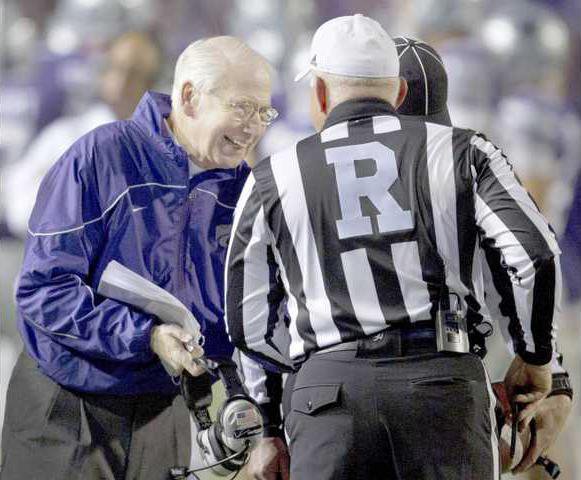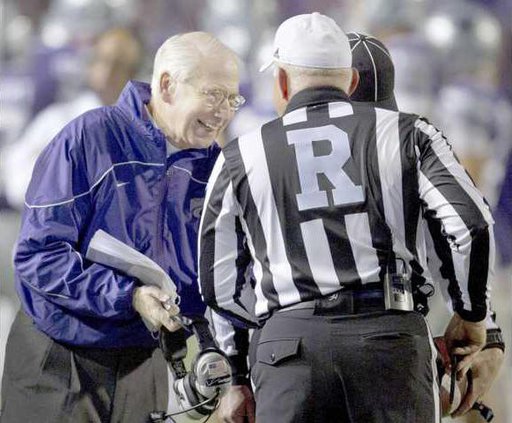MANHATTAN — In the one statistical category all coaches respect, Kansas State has an undeniable advantage.
The Wildcats’ four turnovers through their first eight games are the fewest in the country, and the 24 they’ve forced are fifth-most. The result is a plus-20 turnover margin that’s more than triple any other Big 12 team.
The result? Kansas State (9-0, 6-0 Big 12) has outscored opponents 111-0 off turnovers.
Yes, that’s not a misprint — 111-0 in points off turnovers.
“They just don’t turn the ball over,” said TCU coach Gary Patterson, whose team will try to ruin the Wildcats’ unbeaten season on Saturday night. “If anything’s real scary out there, then they’ll just take what they get, or whatever happens, get to the next play.”
The Wildcats’ offense hasn’t relinquished possession since Sept. 15 against North Texas, and their only turnover in Big 12 play came on a muffed punt against Iowa State.
By contrast, they forced five turnovers in last Saturday’s win over Oklahoma State.
“You travel on the road, and you play a good football team, and you turn the ball over, you’re poor on special teams and you don’t tackle well, you essentially don’t give yourself a chance to win,” Cowboys coach Mike Gundy said after the game.
Impressive as the Wildcats have been, longtime coach Bill Snyder still isn’t content. He made a point of telling his team in Monday meetings that four turnovers this season are four too many.
“I was like, ‘Coach, we haven’t turned the ball over in like, five games!’” tight end Travis Tannahill said. “One every two games is too many — one a season is too many for him.”
Snyder always stresses self-improvement, rather than comparing his team to any past or present opponents. But as turnovers go, the Wildcats’ overall numbers are incomparable.
Even among BCS championship contenders, Kansas State’s ability to retain the ball on offense is stunning: Alabama has eight turnovers (all fumbles) and ranks fourth in turnover margin; Notre Dame has 11 turnovers (five fumbles, six interceptions) and is 19th; and Oregon has 18 turnovers (eight interceptions, 10 fumbles) to rank 17th in turnover margin.
In other words, the Crimson Tide still have double the number of turnovers as Kansas State.
It all comes back to Snyder’s insistence that ball security is the overwhelming priority on offense, and assertiveness the paramount part of playing defense.
Heisman Trophy candidate Collin Klein, who is expected to play Saturday after sustaining an apparent head injury, has only thrown two interceptions while steering clear of turnovers by tucking the ball and running rather than throwing into coverage.
“Running the options, if anything’s real scary out there, then they’re not pitching it,” Patterson said. “They’ll just take what they get, or whatever happens, get to the next play.”
“They’re real consistent. They don’t really make too many mistakes,” TCU cornerback Jason Verrett added. “Their quarterback is real good, he’s real patient.”
On the other side of the ball, the emphasis is on creating turnovers through a willingness to take chances on making a play. Defensive back Allen Chapman may get beaten occasionally, but he also picked off three passes against the Cowboys, returning one of them for a touchdown.
In practice, the priorities are the same.
The Wildcats focus on making scenarios as realistic as possible, with the No. 1 offense often going against the first-team defense in an attempt to recreate the speed of the game.
Running back Angelo Pease never saw a scout team defense continually try to strip the ball from the offense in practice before he came to Kansas State.
“When I was in JUCO, we didn’t do it. When I was in high school, we didn’t do it,” Pease said. “Our scout team goes hard. They try to intimidate the other team, stripping the ball and going hard. I think that helps us.”
The 10 minutes of ball security drills that running backs and tight ends endure every practice also helps. Fail the drill once, a player might get away with repeating it. Let it happen again and there will be repercussions, especially if the ball goes on the ground in live practice.
“You’d probably be running, probably doing push-ups, something like that,” Pease said. “Every time you fumble the ball it’s like, ‘What if you were in the game?’
“We try to treat everything like a game situation,” he said. “If you fumble in the game, that one turnover could be the cause of losing or winning the game, so we take it very seriously.”
TAKEAWAY TAKEOVER
No. 3 Kansas State boasts 111-0 edge in points off turnovers





